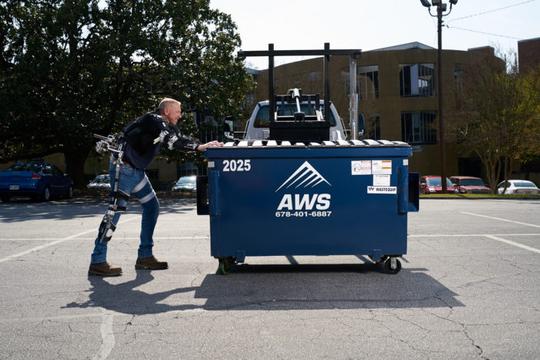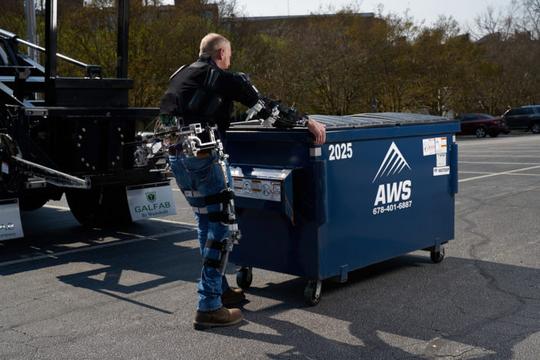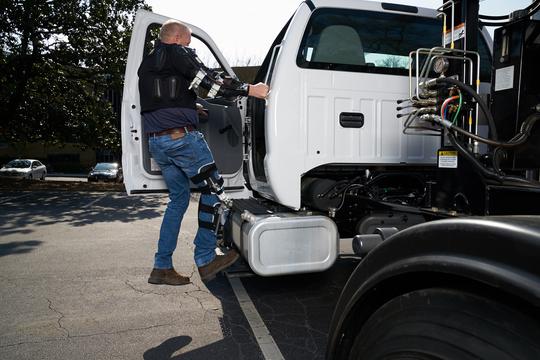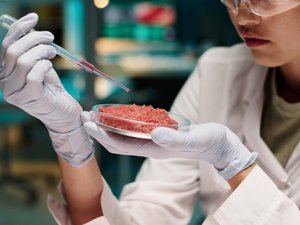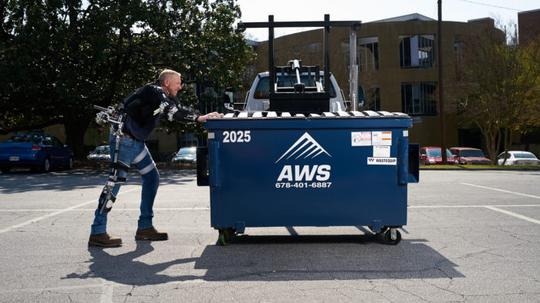
Rubicon Global and Georgia Tech are banding together to develop an exoskeleton that will improve the health of waste slingers, one of the most taxing labor jobs in the country.
The "Uber for recycling" partnered with ramblin wreck engineers in the Exoskeleton and Prosthetic Intelligent Controls (EPIC) Lab led by Dr. Aaron Young to first overhaul a human subject study of waste slingers in Atlanta. Results of the study will determine how Tech engineers will develop a supportive exoskeleton technology through musculoskeletal modeling, which involves analyzing the dynamics of the muscle and bone within the body.
Here's a gallery of an already existing exoskeleton prototype at the EPIC Lab. Rubicon and Georgia Tech plan to develop a prototype following their research study:
Gallery
According to the National Center for Biotechnology Information, a research sector of the National Institutes of Health, garbage collection is one of the most hazardous jobs. Waste slingers are subjected to increased muscle and joint injuries because of the laborious nature of the job, Rubicon Global's Chief Technology Officer Phil Rodoni said.
"There’s a daily grind and wear and tear on their body," he said. "Rubicon does a lot of things to kind of try to improve the health and safety of our drivers and haulers. We focused initially on the vehicle itself, so we do safety pre-checks, we actually read the edge and fault code to make sure the machine they’re driving is as maintained as possible. We give them data relative to the driver’s performance behavior in terms of are they driving too fast in certain areas, cornering too hard, breaking too hard. We do all those thing to kind of improve the overall health of the ecosystem, but this was an area where we can focus directly on the driver, the body of the driver."
During the initial stage of the partnership, engineers in Young's lab will analyze the biometrics of Rubicon's workers and later develop a prototype exoskeleton that best suits their needs. Engineers will analyze the stress in a trash slingers muscles as they perform different tasks, Young said, and capabilities of the exoskeleton will most likely include lumbar and lower limb support, a bracing mechanism and lightweight materials.
"The first phase of this research collaboration between Georgia Tech and Rubicon is going to be taking slingers and bringing them into the biomechanics lab and having them do a task and measuring their joint torts, their joint stresses," he said.
Research for wearable robotics and exoskeletons is picking up at a rapid pace, Young said, and is currently being used by companies across multiple industries to make repetitive motions on the human body easier. At Georgia Tech's EPIC lab, engineers are able to measure different parameters of people using exoskeletons to better the technology, he said.
"One of the biggest things that we can contribute is really in the control system of doing to the math of how do we translate what a person wants to do to what the robot needs to do," he said.
